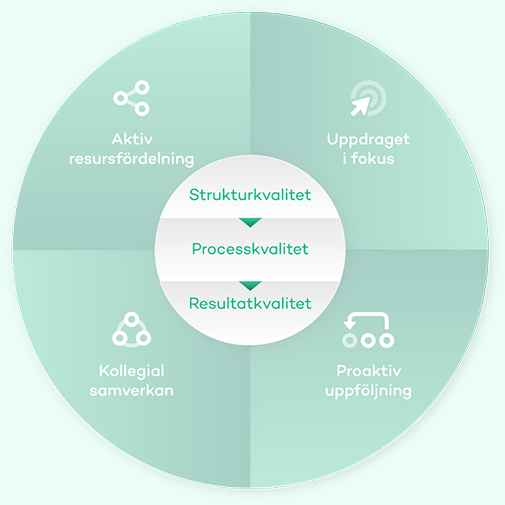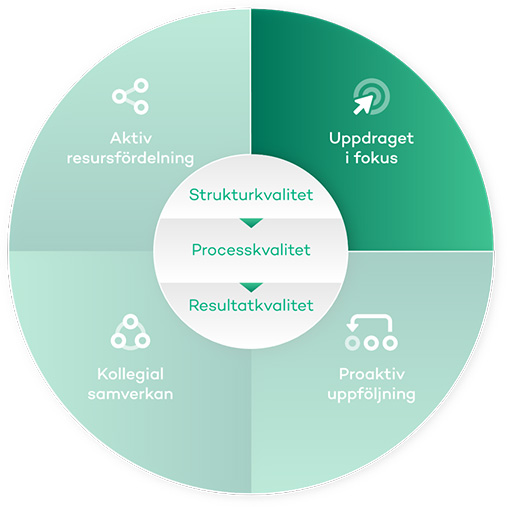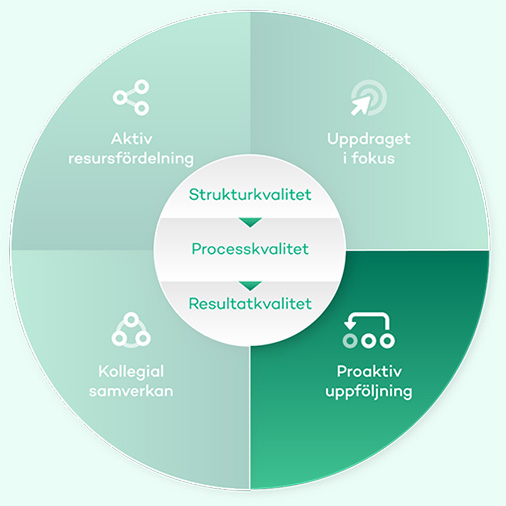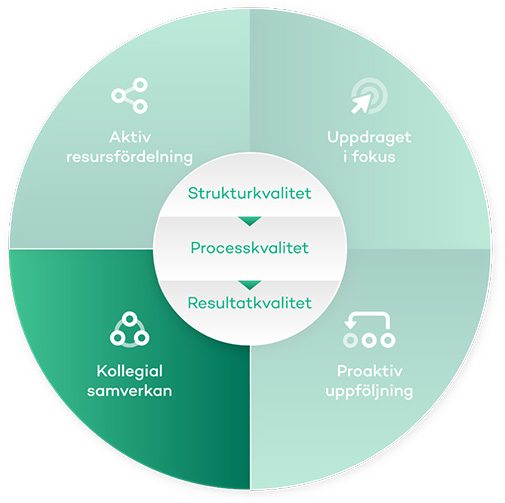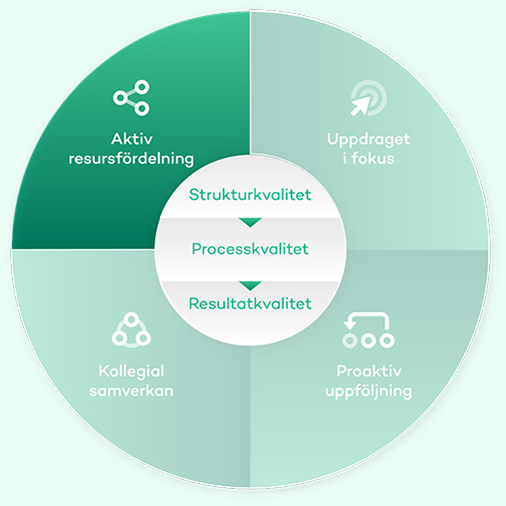The AcadeMedia Model
In order to achieve our vision, we have identified four target areas in which we need to be leaders. These are learning, appeal, efficiency and innovative development. Change through education is about ensuring that all children, students and adult learners reach the goals for their education in accordance with our motto "100% - everyone should reach their full potential ". We also aim for everyone to be satisfied by their experiences with us so that they recommend AcadeMedia to others, both as an education provider and as an employer. In addition, we strive to be an efficient organisation, characterised by new thinking and innovative solutions.
AcadeMedia brings together many different educational providers throughout the field -- preschool, primary school, upper secondary school and adult education. We created the AcadeMedia model based on our common view of quality, which helps us to focus our work on developing and the areas most central to our goals.
The AcadeMedia model is based on research, proven experience and in-depth correlation analyses and covers all operations within the corporate group. In short, the AcadeMedia model focuses on what drives performance development forward. Our common definition of quality has identified the crucial drivers needed to achieve the best possible results. As part of this process establish indicators that we identify, monitor and continuously develop.
Short presentation of the AcadeMedia Model
Our quality aspects
Our common definition of quality* has identified the crucial drivers needed to achieve the best possible results. As part of this process establish indicators that we identify, monitor and continuously develop. Our common definition of quality has identified the crucial drivers needed to achieve the best possible results. As part of this process establish indicators that we identify, monitor and continuously develop.
The indicators with which we manage our activities are sorted under the following quality aspects:
- Structural quality: the methodologies and procedures in place to ensure the best possible running of the business.
- Process quality: our main processes and how the activities that lead to the achievement of our goals work in practice.
- Results quality: our actual results and the degree to which we achieve the goals we have set.
*How we create the conditions (structural quality) for good business practices (process quality) that we reach our set goals (result quality).
1. Focusing on our mission
When making any decisions, we ensure that our mission is supported throughout our organisation and that our number one priority is always the best interests of the children, students and adult participants we are here to educate. Through collective efforts, we aim to ensure that our activities reach our set objectives. Our robust operations enable us to provide the best possible conditions for a good education, which we believe is the key to a good life.
2. Proactive follow-ups
For many years AcadeMedia has developed and utilised thorough systems for self-monitoring. We make sure that we live up to requirements and expectations in multiple ways.
When it comes to education, all primary and secondary schools carry out follow-ups in the form evaluations and/or education evaluations at least every semester. The results provide an overview of how well teaching is working in different schools, classes, and courses, whether there are students who are at risk of failing grades and if there is a need to review distribution and organisation of resources. Corresponding forecasts for target achievement are carried out in AcadeMedia's preschools and also within parts of adult education.
We also carry out regular evaluations of our operations where parents and carers, students and participants, and employees are allowed to provide their thoughts and input. We follow up our work in a timely manner so that we are able to implement any required fixes or solutions as soon as we become aware that they are needed.
3. Collegial cooperation
AcadeMedia's various officials and operations collaborate, exchange experiences and learn from each other on a daily basis. This makes us a very perceptive organisation which is able to ensure a better education for our children, students and adult learners. AcadeMedia sees collective collaboration as the stimulus for our development and we ensure that we create arenas and space for joint learning and experience exchanges at all levels.
It has always been obvious to us that we should endeavour to collaborate and exchange experiences with experts and organisations outside of AcadeMedia. We have strong, ongoing relationships with school authorities, municipal and independent education providers, and universities, as well as organisations such as Sweden's Municipalities and Regions, The National Confederation of Free Schools and The Independent Research Institute Ifous.
4. Active allocation of resources
Being a part of AcadeMedia means that you are provided with support and resources through different channels to help you succeed in your role. In Sweden, our common resources and competencies are collected within AcadeMedia Support to assist our educators and headteachers in the most proficient and effective way possible. Examples of common functions are IT, payroll administration, purchasing, real estate and ongoing HR and financial services.
In addition, there is AcadeMedia Academy, which is our intranet for training, development and competence provision.
AcadeMedia continuously adapts its organisation, staffing and other resources. We carefully analyse our operations from various quality aspects and adjust the distribution of resources during the operating year. It is important for us to continuously evaluate where the greatest challenges and needs are. In this way, we take our compensatory mission seriously.
